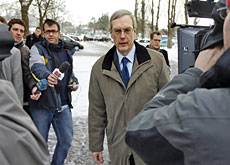Bruggisser attacks prosecution in Swissair case

The former chief executive of the SAirGroup, Philippe Bruggisser, has denied charges of disloyal management and falsifying documents at the Swissair trial.
Bruggisser, who ran the defunct airline group from 1996 and was fired early in 2001, said the prosecution’s financial experts had drawn “absurd” conclusions about the merger of a subsidiary with the carrier.
“I am not guilty of what I have been accused of,” said the former CEO, one of 19 top executives and board members on trial over the collapse of the national flag carrier.
Bruggisser is being tried in the court at Bülach near Zurich, over his role in the merger of Roscor, a Swissair subsidiary that owned part of the Galileo ticket reservation system, with the carrier.
Roscor was ceded to the airline at no cost, an operation that amounted to a SFr100 million ($80 million) loss for the company’s creditors according to the prosecution.
But the former CEO said there had simply been no change of ownership and therefore no financial loss.
Questioned about the extent of Swissair’s debts, Bruggisser, like the company’s last CEO Mario Corti and board member Thomas Schmidheiny, said the airline was not overburdened.
He added there were significant hidden reserves since Swissair was given a fairly low value in the group’s books.
Struggling
Bruggisser admitted that the carrier was struggling in December 2000 but not as much as many people thought.
Asked why he was fired in 2001, Bruggisser said he was told it was due to the company’s poor performance in 2000 and falling share value. He admitted it was probably due also to the failure of the so-called “hunter” strategy, which involved buying stakes in other airlines as part of an expansion policy.
This led to major financial problems, particularly with the company’s stakes in the Belgian national carrier Sabena and smaller French companies.
Massive increases in fuel prices and a strong dollar did little to help the carrier’s bottom line.
But Bruggisser told the court that experts’ estimates had shown the company would have been able to climb back into the black by 2003.
Bruggisser, who began working for Swissair in 1979, received compensation worth SFr2.2 million after being asked to leave, plus another SFr3.75 million from the company pension fund. He works today as an independent aviation consultant.
swissinfo with agencies
The trial opened on January 16 and should run until March 9 at Bülach district court near Zurich.
There are 19 defendants.
The investigation took five years and produced 280 metres worth of documents.
The prosecution’s indictment runs to 100 pages.
All the defendants who have so far appeared have proclaimed their innocence.
Apart from Bruggisser, Corti and Schmidheiny, all the others refused to answer questions because it could prejudice civil proceedings brought by former employees and shareholders seeking compensation.
Swissair planes were grounded in October 2001, after the company had been in business for 71 years.
The downturn in the aviation market after the terrorist attacks of September 11, 2001, proved the last straw for the heavily indebted Swissair, which folded the following year.
The airline collapsed after buying stakes in numerous loss-making airlines, including Belgium’s Sabena and Poland’s Lot, in an attempt to form its own airline alliance.
Swissair left behind debts to the tune of SFr17 billion ($13.7 billion) and resulted in 5,000 job losses.
The remains of Swissair and the regional carrier Crossair were brought together in 2002 to form the new national carrier Swiss, which was in turn taken over by Germany’s Lufthansa in 2005.

In compliance with the JTI standards
More: SWI swissinfo.ch certified by the Journalism Trust Initiative











You can find an overview of ongoing debates with our journalists here . Please join us!
If you want to start a conversation about a topic raised in this article or want to report factual errors, email us at english@swissinfo.ch.